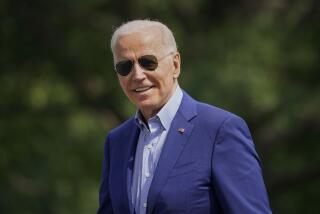Bush Budget May Add to Cost of SBA Loans
The budget proposed by President Bush would make Small Business Administration loans substantially more expensive for many borrowers and could keep some of them from getting needed financing.
The proposal, which faces opposition in and out of Congress, would increase the fees paid by borrowers and lenders under the SBA’s popular 7(a) lending program. And because SBA lenders commonly pass their own costs along, the good bet is that business borrowers will take a big hit if the proposal becomes law.
Effective with the start of the federal fiscal year in the fall, the Bush budget proposes to:
* Make no change in the fees paid on 7(a) loans of less than $150,000, now 2% annually.
* Increase the fees paid on loans between $150,000 and $700,000 from 2% to 3.5% annually.
* Increase the fees paid on bigger loans from 2% to 4% annually.
* Increase the fees paid by lenders on all 7(a) loans from 0.5% to 0.8875% annually.
According to SBA figures, most business borrowers in California fit squarely into the two bigger categories targeted by these changes.
In the fiscal year ended last fall, 2,508 borrowers took out 7(a) loans of less than $150,000 in the state, while 3,747 took out loans between $150,000 and $700,000 and 932 took out loans exceeding $700,000.
Loans in all three categories exceeded $2.6 billion, of which $2.4 billion went out in loans of $150,000 or more--the categories facing fee increases in Bush’s budget.
Clearly, the new fees in the Bush budget target the bulk of business borrowers seeking 7(a) loans.
They would apply to that part of an SBA loan guaranteed by the government--under current law 75% of loans exceeding $150,000. Interest on these loans floats with prime, and lenders may charge no more than prime plus 2.75% for terms longer than seven years.
*
Should the proposed fees take effect, the numbers on 7(a) loans would work out this way: Given a prime rate of 8%, the interest and annual fees on a loan of $500,000 payable over 10 years comes to 12.75% now--8% plus 2.75% plus a fee of 2%. The new fees in the Bush budget would apply to 75% of the loan amount, or $375,000, making the interest and fees payable on that sum 14.25%--10.75% plus a 3.5% annual fee. The interest on the balance would remain at 10.75%.
But that’s not all. At present, lenders pay the government an annual fee of 0.50% of the guaranteed amount, and the Bush proposal seeks to increase this to 0.8875%. Thus, assuming that lenders pass this increase along to borrowers, the total interest rate on the SBA-guaranteed part of a $500,000 loan goes over 15%.
Any way you look at it, that’s a lot of interest for a loan program designed to spur growth among small businesses, say critics of the Bush budget. Worse, the increases target business borrowers in the midst of an economic slowdown aggravated, in California, by the energy crisis.
“The proposal to raise fees on SBA loans may price many borrowers out of the market,” said Howard Gantman, communications director for Sen. Diane Feinstein (D-Calif.). “If you look at the effects that the energy crisis is having, it’s a double whammy.”
Two other Senate critics of the proposal, Sens. John F. Kerry (D-Mass.) and Christopher S. Bond (R-Mo.), have offered legislation to keep SBA fees as they are.
“I do not believe it is the intention of the . . . Congress to deny needed business loans to small-business borrowers at the same time the economy is slowing and credit underwriting standards have tightened significantly,” Bond wrote in a letter to Sen. Pete V. Domenici (R-N.M.), chairman of the Senate budget committee.
*
Meanwhile, Anthony R. Wilkinson, president and CEO of the National Assn. of Government Guaranteed Lenders, a lobbying group headquartered in Stillwater, Okla., said fees currently payable under the 7(a) loan program actually generate a profit to the government. During fiscal 1992 through 1998, Congress appropriated $1.4 billion for the 7(a) program, Wilkinson said, of which $1.3 billion has returned to the Treasury, with more on the way.
“We fully believe that the money returned to the Treasury will exceed the amount appropriated,” he said.
The Bush administration disputes that assertion, arguing that loss ratios in the SBA’s loan programs have made subsidies necessary in the past--and that the new fees will make the 7(a) program, at least, self-sustaining.
SBA lenders point out that the proposal would affect most of those seeking loans under the 7(a) program even though the increases don’t affect loans of less than $150,000.
A spokeswoman for Wells Fargo & Co. noted that according to SBA figures on California borrowers, loans averaged $330,000 in the first six months of last year. The bank’s average SBA loan exceeded $205,000 and the bulk of the bank’s SBA loans fell into the $150,000-to-$700,000 category targeted by the Bush proposal.
A spokeswoman for Bank of America Corp. said that of the number of SBA loans approved by B of A last year, 26% fell into the same category, but the loans accounted for 61% of the total dollar amount of SBA loans approved last year.
John Canning, president of CIT Business Lending Corp. in Livingston, N.J., one of the country’s largest SBA lenders, added that the increase in fees payable by lenders--and probably to come out of borrowers’ pockets--may price many of them out of the market.
“The average SBA loan was $240,000 last year,” he said, “and if the lender on the average loan passes the fees through, the total impact over 25 years is $20,000--about 8%. I don’t think small business needs an 8% increase in costs right now.”
*
Recent Financing and Insurance columns are available at http://161.35.110.226/finin. Juan Hovey can be reached at (805) 492-7909 or at jhovey@gte.net.
More to Read
Get the L.A. Times Politics newsletter
Deeply reported insights into legislation, politics and policy from Sacramento, Washington and beyond. In your inbox three times per week.
You may occasionally receive promotional content from the Los Angeles Times.










